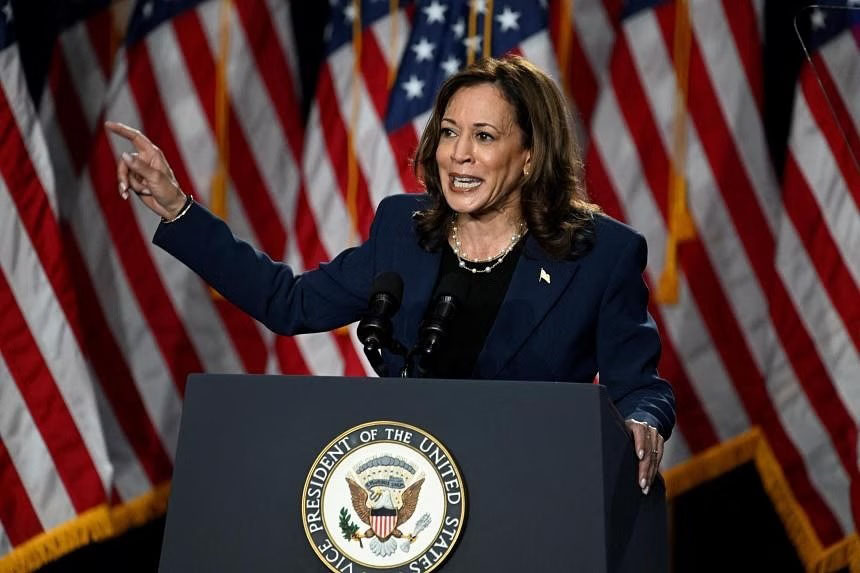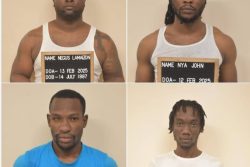MILWAUKEE, (Reuters) – U.S. Vice President Kamala Harris assailed Donald Trump yesterday at her first campaign rally since replacing President Joe Biden as the Democratic presidential candidate, while a Reuters/Ipsos opinion poll showed her taking a marginal lead over her Republican rival.
In a 17-minute speech, Harris aggressively went after Trump’s vulnerabilities, comparing her background as a former prosecutor to his record as a convicted felon.
Harris ticked through a list of liberal priorities, saying that if elected she would act to expand abortion access, make it easier for workers to join unions and address gun violence, drawing a sharp contrast with Trump, the Republican nominee for president in the Nov. 5 election.
“Donald Trump wants to take our country backward,” she told a cheering crowd of several thousand at West Allis Central High School in a Milwaukee suburb in Wisconsin, a battleground state with a pivotal role in deciding the election outcome.
“Do we want to live in a country of freedom, compassion and rule of law, or a country of chaos, fear and hate?”
The raucous rally was a notable contrast to the smaller, more subdued events Biden held, underscoring Democrats’ hope that Harris, 59, can revive what had been a flagging campaign under Biden, 81. The audience danced and waved Harris signs, while chants of “Ka-ma-la!” broke out when she took the stage.
She emphasized her commitment to reproductive rights, an issue that has plagued Republicans since the U.S. Supreme Court – powered by three Trump-appointed justices – eliminated a nationwide right to abortion in 2022.
Harris led Trump 44% to 42% among registered voters in the national Reuters/Ipsos poll, conducted on Monday and Tuesday after Biden dropped out of the contest on Sunday and endorsed Harris as his successor.
A Reuters/Ipsos poll last week showed Biden, before he ended his campaign, trailing Trump by a marginal two percentage points.
Both were within the poll’s 3-point margin of error, but the results could signal limited movement in Democrats’ direction – and may suggest that Harris’ elevation to the top of the ticket blunted whatever momentum Trump hoped to gain from last week’s Republican National Convention, also in Milwaukee.
Trump and his allies have tried to tether Harris to some of Biden’s more unpopular policies, including his administration’s handling of the surge of migrants at the southern border with Mexico.
In a conference call with reporters on Tuesday, Trump expressed confidence in his ability to defeat Harris, noting that her previous presidential run in 2020 did not even survive until the first statewide nominating contest.
“If she campaigns the way she campaigned, then you know, I suspect she won’t be too tough,” he said.
Trump also said he would meet in Florida on Friday with Israeli Prime Minister Benjamin Netanyahu, who is due to address Congress on Wednesday.
Harris swiftly consolidated her party’s support after Biden, 81, abandoned his reelection campaign under pressure from members of his party who worried about his ability to beat Trump, 78, or to serve for another four-year term.
She wrapped up the nomination on Monday night by winning pledges from a majority of the delegates who at next month’s party convention will determine the nominee, the campaign said.
Most Democratic lawmakers have lined up behind her candidacy, including the party’s leaders in the Senate and House, Chuck Schumer and Hakeem Jeffries, who endorsed Harris on Tuesday at a joint press conference.
Control of both chambers of Congress will also be up for grabs in the November election, and Democrats face an uphill fight trying to protect their Senate majority, as they defend multiple seats in Trump-backing states. Without congressional majorities, Harris would have a hard time achieving many of her goals, particularly on gun control and abortion.
Harris’ rise dramatically reshapes an election in which many voters were unhappy with their options. As the first Black woman and Asian American to serve as vice president, she would make further history as the first woman elected U.S. president.
Wisconsin is among a trio of Rust Belt states, along with Michigan and Pennsylvania, that are critical for Democrats’ chances of defeating Trump.
“There are independents and young people who did not like their choices, and Harris has a chance to win them,” said Paul Kendrick, executive director of the Democratic group Rust Belt Rising.
Alyssa Wahlberg, 19, chair of the Whitewater College Democrats, said Harris had reenergized young voters, particularly women who want Harris to break the ultimate U.S. glass ceiling.
“I talked to my grandmom – we are both excited that she may live to see the first woman president,” said Wahlberg, who was attending Tuesday’s rally. “It’s taken too long.”
Saddled with concerns that included his health and persistent high prices crimping Americans’ household finances, Biden had been losing ground against Trump in opinion polls, particularly in the competitive states that are likely to decide the election, including the Sun Belt states of Arizona and Nevada.
While a wave of senior Democrats have lined up behind Harris, the racial justice group Black Lives Matter on Tuesday challenged the party’s swift move.
It called for a national virtual snap primary ahead of the Aug. 19-22 Democratic National Convention in Chicago, where the party will formally nominate its candidate.
“We call for the Rules Committee to create a process that allows for public participation in the nomination process, not just a nomination by party delegates,” Black Lives Matter said in a statement to Reuters.
Biden said on X that he would deliver a Wednesday night Oval Office speech explaining his decision to end his campaign. He returned to Washington on Tuesday after spending several days isolating at home with COVID-19. The president has tested negative and no longer has symptoms, the White House doctor said in a letter on Tuesday.
Biden’s dramatic exit followed Trump’s narrow survival of a July 13 assassination attempt that raised questions about security failures in the U.S. Secret Service. The agency director, Kimberly Cheatle, resigned on Tuesday.
Democratic National Committee chair Jaime Harrison, in an interview on NBC’s “Today” program, said the party had to move quickly to get the ticket on ballots in all 50 states, and that the vice presidential pick needed to be made by Aug. 7.
Potential running mates include Kentucky Governor Andy Beshear, U.S. Secretary of Transportation Pete Buttigieg, North Carolina Governor Roy Cooper, Arizona Senator Mark Kelly, Illinois Governor J.B. Pritzker, Pennsylvania Governor Josh Shapiro and Michigan Governor Gretchen Whitmer, according to people familiar with internal policy discussions.









